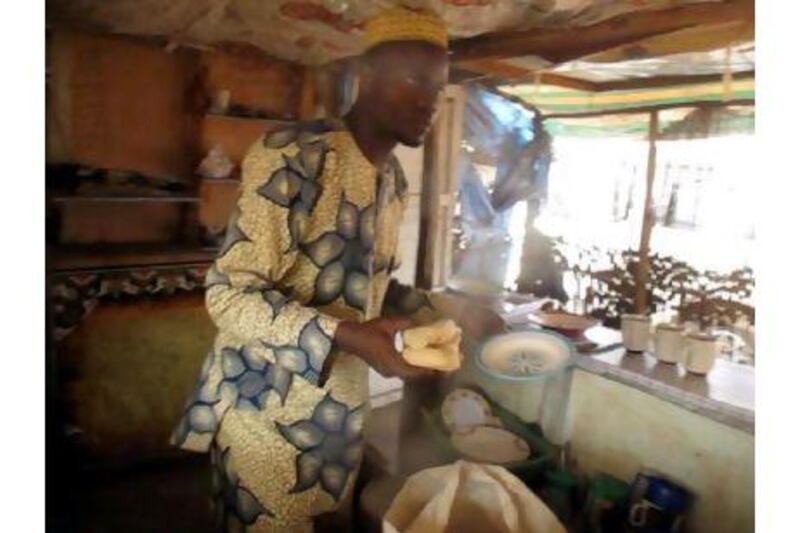In hindsight, it seems the omelette seller gave us a last flicker of reality before entering Nigeria. We'd joined up with Luke, a model of laid-back affability, a few days earlier in Abomey, Benin. Where Roger and I are curmudgeons, Luke is a tonic of forbearance on a journey that requires it in large doses. The three of us ignore the money changers milling about the unsurfaced car park at the Nigeria-Benin border where the hired car drops us, and fuel up with a breakfast served by the omelette man along with fresh baguettes and the best herbal tea - the only herbal tea, I think - I've enjoyed in Africa, infused with what smells like lemongrass.
Here, things start getting screwy. The money changers offer us the impossibly good rate of 15,000 Nigerian naira for 10,000 West African francs (Dh77), a sum that should yield only about 3,000 naira. We assume this is either a misunderstanding, a bad joke or - most likely - a con artist peddling counterfeit bills. But it happened repeatedly. It turns out that "five thousand" is just the local lingo for 1,000 naira. Naturally.
"How much is this?" Luke asks, pointing to a single bill in a changer's stack of 1,000-naira notes. "Five thousand," he replies. The man begins counting out 200-naira notes. "One, two, three, four, five." And 10,000 actual West African francs will get you 15,000 of those, or 3,000 naira. Got it?
Later, once we're well on the road, Roger turns to me and asks, "What pill did you slip me?" We may as well have dived head first into a rabbit hole at this point. Our suspicions fall on the strange brew of the omelette seller.
From the car park, it's a short walk down a dirt road into Nigeria itself. This frontier, seldom used by tourists, straddles a village so small it doesn't appear on our maps. In the unmarked Benin immigration office, a boy and a man together copy our names into a book at a pace so excruciatingly slow we wonder if somebody has fiddled with the knobs on our temporal lobes. The realisation that the man has probably had a stroke tempers our impatience; this may be his own son helping him out on the job, reading the passport information aloud to him, letter by letter.
We have to hike to the opposite side of town to find Nigerian immigration control, finally locating it in a secluded building in a clearing down a dead-end road. Duly stamped, we arrange transport to Abeokuta, where we'll change buses and proceed to the city of Ibadan, north of Lagos, to spend the night.
Waiting for the minibus to fill up, I venture alone to an area behind the bus station car park. Smouldering brush surrounds a clutch of unused huts, or what looks like an abandoned market. Brush fires cover huge swathes of West Africa, especially during the dry season, often coming right up to the roadway - close enough that you'll feel the heat as you pass, in fact - so I should be used to this by now. Still, it's creepy.
Maybe it's because Roger and I have both just finished Cormac McCarthy's The Road, a harrowing novel about a boy and a man walking across the burning America of a dystopic future where people have resorted to cannibalism. We've both noted the visual correlation. Here, as the smoke rises around me in the abandoned market, I hear the echoes of another apocalyptic scene: Robert Duvall loving the smell of napalm in the morning.
The minibus finally sets out through rolling hills, but we're stopped no less than five times on the road to Abeokuta, with checkpoints sometimes within a kilometre or two. Each time, we have to get out and fill out forms. We're asked more questions than anywhere in Africa so far: the purpose of our journey, why we don't have our own vehicle, and why our vaccination cards aren't exactly the way they should be, which of course they are. Notably, nobody once asks for a bribe, or "dash" as the Nigerians call it. One plainclothes officer tells us that in three years of working this route, he's never encountered foreigners using public transport.
We'd more willingly bear the hassle were it not for our driver, who seems to possess, in addition to the characteristic scar on his nose, a habit of screaming every syllable at the top of his lungs. The shouting is constant. "Sit down, sit down! No problem!" he screams to Luke and I, riding in the passenger seats, whenever we come to a checkpoint. We nearly always have to disembark anyway. When the other passengers in the minibus grumble about the constant stops, we object that it's not our fault. "It's your fault!" the driver screams back, angry now. "It's your fault, because you're white!"
Luke asks him to stop screaming, to no avail. Luke tells him to stop screaming. Luke demands that he shut his mouth for five minutes. "I'm going to mark this day in my diary," Roger says, after we finally escape the clamour in Abeokuta. "I finally found somebody that Luke doesn't like."
Scott MacMillan is blogging about his journey on his website, www.wanderingsavage.com





